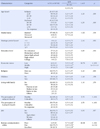Abstract
Purpose
The purpose of this study was to analyze factors influencing the quality of life in Vietnamese married immigrant women in Korea. The factors included socio-demographic characteristics, spouse's support, and social support of Vietnamese married immigrant women.
Methods
A descriptive survey was conducted to collect data from 190 subjects during the period between May and June, 2015. The randomly sampled subjects answered a self-report questionnaire translated into Vietnamese. Collected data were analyzed using SPSS/WIN 21.
Results
The subjects' quality of life was found to be influenced by economic level, subjective perception of their own and spouse's health, Korean communication ability, spouse's support, and social support. The most influential factor for the quality of life was spouse's support, and next, subjective perception of their own health, Korean communication ability, and economic level in order of influence.
Conclusion
The results of this study suggest that social support programs should be customized to the subjects' characteristics in order for married immigrant women to adjust themselves to new Korean environments and to lead a high-qualitylife through the promotion of marital relationship, Korean communication ability, health status, and economic capability.
Figures and Tables
Table 1
Differences of QOL according to the Sociodemographic Characteristics (N=190)

Table 2
The Scores of a Social Support and Spouse's Support (N=190)

Table 3
Correlation among Economic Status, the Perception of Health, Korean Communication Ability, Support and Quality of Life (†=190)

Table 4
Variables Influencing on the Quality of Life

References
1. Korea Imigration Service. KIS statistics 2014 [Internet]. Gwachon: Korea Imigration Service;2015. cited 2015 April 11. Available from: http://www.immigration.go.kr/doc_html/attach/imm/f2015//20150701229489_1_1.pdf.files/PDFBook.html.
2. Korea Imigration Service. KIS statistics 2015 January monthly report [Internet]. GwaChon: Korea Imigration Service;2015. cited 2015 April 11. Available from: http://www.immigration.go.kr/HP/COM/bbs_003/ListShowData.do?strNbodCd=noti0097&strWrtNo=167&strAnsNo=A&strOrgGbnCd=104000&strRtnURL=IMM_6070&strAllOrgYn=N&strThisPage=1&strFilePath=imm/.
3. Lee JH, Jin SJ, Ju HJ, Cho YS. The impact of marriage migrant women's Korean language ability, self-esteem, and acculturative stress on their family health: Focused on mediating effects of marital adjustment. J Korean Acad Community Health Nurs. 2013; 24(1):87–98. DOI: 10.12799/jkachn.2013.24.1.87.

4. Seol DH, Kim HS, Yoon HS, Lee HK, Yim KT, Chung KS, et al. Foreign wives' life in Korea: Focusing on the policy of welfare and health. Sejong: Ministry of Health and Welfare;2005. 06. Report No.: 11-146000-002610-01.
5. World Health Organization. WHOQOL User Manual [Internet]. Geneva: World Health Organization;2012. cited 2015 April 11. Available from: http://apps.who.int/iris/bitstream/10665/77932/1/WHO_HIS_HSI_Rev.2012.03_eng.pdf.
6. Kim JH. A study on quality of life of married immigrant women [master's thesis]. Seoul: Korea University;2012. 66.
7. Kim S. The determinants of quality of life: A case of marriage migrant women in rural Korea [master's thesis]. Seoul: Seoul National University;2013. 94.
8. Kim M, Kim A. The impact of Korea immigrant women's resources on their satisfaction with family relations and life. Fam Cult. 2012; 24(2):64–100.
9. Seo MS, Park KS, Park HM, Park HO. A study on health behavior and quality of life of married immigrant women. J Korean Soc Menopause. 2013; 19(2):112–121.

10. Kim HO. Quality of life in married immigrant women -focused on Gimhae city- [master's thesis]. Kimhae: Kaya University;2014. 80.
11. Kim MJ. Effects of domestic violence, acculturation stress, and social support on the mental health of migrant women in international marriages. Korean J Fam Ther. 2011; 19(3):1–28.
12. Kim HJ. A study of spousal support the demand for health education and quality of life married female immigrants. Korean J Women Health Nurs. 2008; 14(1):5–11.
13. Joo YJ. Research on the delivery of the marriage migrant women from Vietnam. [master's thesis]. Seoul: Chung-Ang University;2014. 86.
14. Statistics Korea. 2013 marriage, divorce statistics [Internet]. Daejeon: Statistics Korea;2014. cited 2015 April 12. Available from: http://kostat.go.kr/smart/news/file_dn.jsp?aSeq=313207&ord=2.
15. Chang SB, Lee KH. An analytic study on influencing factors for sexual satisfaction in women who had a hysterectomy. J Nurs Acad Soc. 1989; 19(2):160–172.
16. Abbey A, Abramis DJ, Caplan RD. Effects of different sources of social support and social conflict on emotional well-being. Basic Appl Soc Psych. 1985; 6(2):111–129.

17. Stoker MJ, Stoker GC, Beaumont G. The SmithKline Beecham 'quality of life' scale: A validation and reliability study in patients with affective disorder. Qual Life Res. 1992; 1(6):385–396.

18. Yoon JS, Kook SH, Lee MS. A preliminary study on Korean version of SmithKline Beecham quality of life' scale (KvSBQOL). J Korean Neuropsychiatr Assoc. 1998; 37(2):280–294.
19. Yoo EK, Kim HJ, Kim MH. Factors influencing quality of life in married immigrant women in Korea. Journal of Korean Academy of Nursing. 2012; 42(2):171–180. DOI: 10.4040/jkan.2012.42.2.171.

20. Park JS, Chung YJ, Ryu HS. The effects of marriage commitment and marital stress on QOL in intermarried Korean husband. Minjok Yeonku. 2015; 61:168–189.
21. Chang OJ, Park JY. A study on marital adaptation of international married Korean husbands. Fam Cult. 2009; 21(2):1–27.
22. Song JH, Lee TY. A study on marital adjustment factors among multicultural couples. Health Soc Welf Rev. 2010; 30(2):164–192.
23. Jang HS, Lee YJ. Relationship among attachment style, communication competence and marital satisfaction. Korean J Dev Psychol. 2007; 20(4):17–32.
24. Chu HH, Park OI, Kim JH, Park JS. The effect of family stress and social support on marital adjustment for the immigrant woman's husband. Korean J Fam Welf. 2008; 13(4):85–101.
25. Lee EJ. A study on family values of Vietnamese women [dissertation]. Seoul: Donggk University;2015. 157.
26. Oh GS, Kim YJ. Factors influencing quality of life in married immigrant women in Chungbuk area. J Korean Soc Multicult Health. 2013; 3(1):15–25.
27. Kim H, Yoo S, Cho S, Kwon EJ, Kim S, Park JY. Health status and associated health risks among female marriage immigrants in Korea. Korean J Health Educ Promot. 2010; 27(5):79–89.
28. Kim C, Park MS, Kim EM. Married immigrant women's utilization of health care and needs of health services. J Korean Acad Community Health Nurs. 2011; 22(3):333–341. DOI: 10.12799/jkachn.2011.22.3.333.

29. Jung YA, Choi WG. The present state and task of married immigrant women's information literacy. J Peace Stud. 2012; 13(3):293–312.
30. Kim YH, SEO YJ. Health-related quality of life among immigrant women who married Korean men. J Womens Stud. 2014; 24(1):35–62.




 PDF
PDF ePub
ePub Citation
Citation Print
Print



 XML Download
XML Download